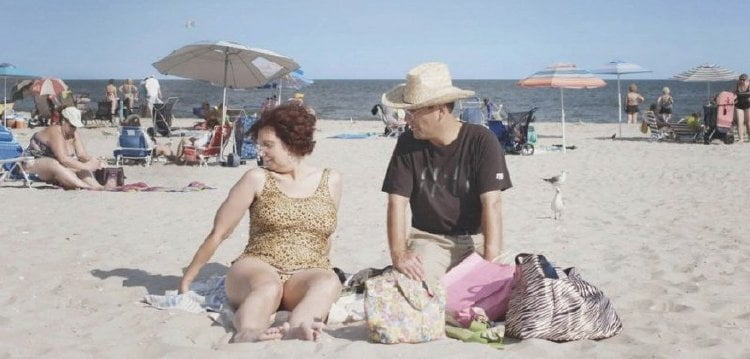Dina

Dina and Scott are about to get married. They are not an average couple, though, as each copes with their autism and they work hard to make a life together in “Dina,”
Laura's Review: B
Documentarian Dan Sickles' ("Mala Mala") father was a teacher who founded Philadelphia's Aktion Club for neurologically diverse adults. After he passed, Dan saw many of the club members at his dad's funeral and convinced his codirector Antonio Santini that the club would be a great subject for their next film. But then, he learned one who'd he'd known all his life was getting married, and so their focus turned to "Dina." It didn't hurt that 49 year-old Dina Buno had not only had a difficult life, but had always wanted to be an actress, giving the filmmakers incredible access to their subject. The Grand Jury Prize for Documentary at the Sundance Film Festival has been called a romantic comedy, and in many ways it is, but it also reveals the special struggles and heartbreak involved when two people on differing scales of Autism Spectrum Disorder decide to make a life together, Dina's fiance, Scott Levin, far less comfortable with the physical side of affection. Some of what we view through Santini and Sickles' static camera is so intimate, one wonders if they were present while the scene was shot. Apparently they were, Dina so used to their presence, their patience often producing 20 seconds of what we see from hours of footage. Dina is quite the character, such a non-stop talker she chatters through a dental procedure. She will tell anyone willing to listen that she'd been married before and was stabbed by a later, 'psycho' boyfriend, a tendency that irritates her mother no end. (The filmmakers play the 911 call from the latter incident late in the film and it is chilling, a bleak and negative twist on relationships with those suffering mental disorders.) The film's driving throughline, though, is that impending marriage, one whose way has been paved by Frank and Monika, a couple who double date with Dina and Scott. They're not there when Dina takes Scott on a series of bus rides for his first view of the ocean in Ocean City, NJ. Scott's nervous about the trip, which Dina handles with aplomb, but when she gifts him with a sex manual and some hilarious observations, she notes 'I think I'm more interested in this than you are.' Indeed, she spends much of a game of mini golf confiding to Frank about Scott's reluctance to touch her. The night before their wedding is a study in contrasts, Scott talking to two male buddies about performance anxiety, Dina and crew enjoying a rambunctious male stripper in her apartment. The filmmakers present their home city in quite a different light than we are used to seeing, Scott's parents' home a stone row house reminiscent of those in the English seaside towns. The wedding is held at a diner, nostalgic American kitsch at its finest. The film, like its couple, is sweet and awkward, ending with hope for their future. Grade:
Robin's Review: B
If I did not know better, after seeing “Dina,” I would have sworn that it is a feature film with actors in the main roles of Dina and Scott. It is not that “Dina” has great production values – much is shot on a stationary video camera in whatever locale that presents itself. What makes me feel this way is the intimacy the filmmakers have with their subjects. Dan Sickles and Antonio Santini have an ace in the hole in achieving this intimacy. The Sickle family members are longtime friends of the lady of the title. This, I think, goes a long way in getting the subjects to accept the presence of the documenters and their camera. This comfort level is obvious as we follow the couple, together and separately as they go about making engagement plans, trying out living together before the wedding, Scott’s adjustment to a life away from his parents and the preparations for the wedding. “Dina” is a sweet slice of life look at an autistic couple who you get to know - and like getting to know.

